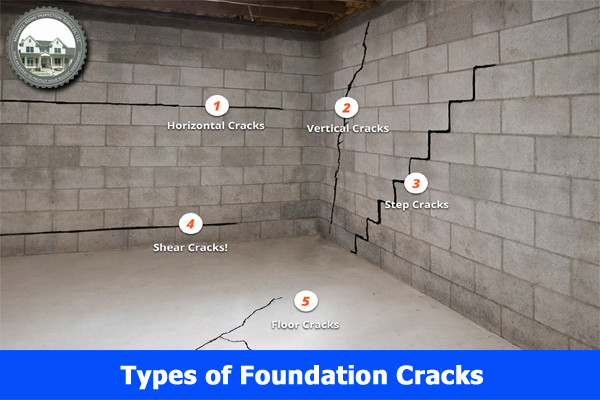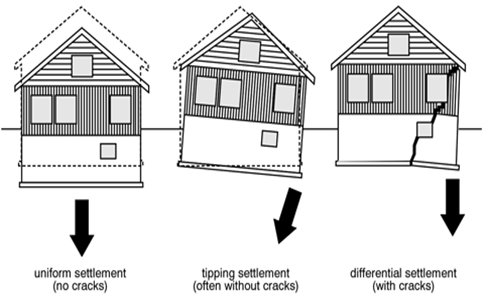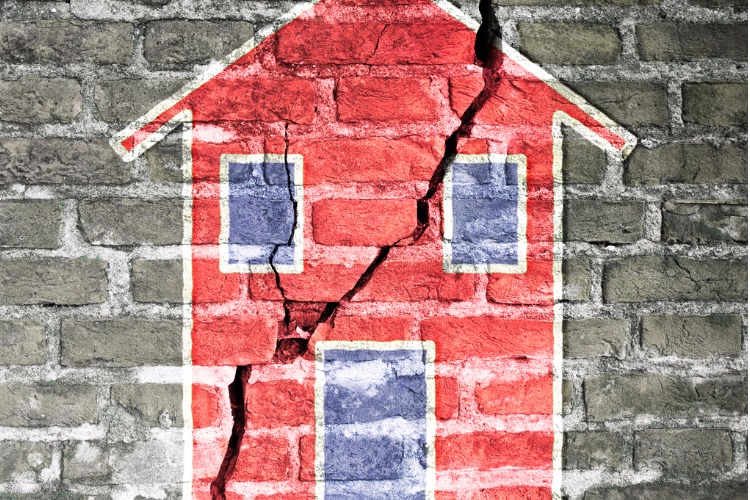As most homeowners know, foundation cracks are fairly common. While some cracks are cosmetic and require little if any repair, others can indicate a serious issue with your foundation. If you’re curious how to tell if a foundation crack is serious, keep reading. In this article, we will discuss different types of foundation cracks and how to know when to call a professional.
Types of Foundation Cracks
Vertical Cracks
Vertical (or up and down) foundation cracks are very common and are typically the result of normal settling of the home. Even new homes may have a few small vertical cracks along the foundation. Generally speaking, small vertical foundation cracks are not cause for great concern. A great way to estimate the size of a foundation crack is to use a dime. If you can’t fit the edge of a dime into the crack, it can be considered a small crack. If you prefer a more precise measurement, call a professional to inspect any crack larger than 1/4” wide.

Our Advice: If you notice a small vertical crack on your foundation, we recommend photographing and monitoring it for a few months. As long as it doesn’t get larger, you can fix it yourself using an epoxy concrete repair kit available at most hardware stores. If the crack gets larger, or if you notice water seepage through the crack, give us a call.
Horizontal Cracks
Horizontal cracks are more prevalent in brick and cement block foundations. Horizontal cracks are caused by strain from water pressure and the underlying soil. Horizontal cracking does usually indicate a more serious foundation issue that should be inspected immediately.
Our Advice: If you notice any horizontal cracks in your foundation, call a reputable foundation repair professional as soon as possible. This type of cracking indicates an issue that will only get worse with time.
Diagonal Cracks
Cracks that run diagonally across the foundation are usually indicative of uneven settlement due to adverse soil conditions. Small diagonal cracks should be monitored, but those larger than ¼” wide should be evaluated by a foundation repair professional.
Our Advice: Monitor small diagonal cracks and call a foundation repair professional if they expand over time. Cracks over 1/4” wide should be evaluated by a professional as soon as possible.
Stair Step Cracks
Stair step cracks refer to cracks along mortar joints between individual blocks in the foundation. They are usually caused by the home settling unevenly. Like horizontal and diagonal cracks, they are indicative of a potentially serious issue and require an evaluation by a foundation repair professional.
Our Advice: If you notice stair step cracks around your foundation, give us a call for a no-obligation evaluation of the damage and recommended repair plan.

When to Call a Professional Foundation Repair Company
If you notice any of the following foundation issues, we recommend calling a professional foundation repair company as soon as possible:
- Any horizontal, diagonal or stair step cracks larger than ⅛” wide
- Any vertical cracks larger than ¼” wide
- Any cracks in which water is seeping into your crawl space
- Any small cracks which are expanding rapidly
Summary
While foundation cracks are fairly common, not all cracks are serious. Knowing what to look for and when to call a professional can save you time and money. Generally speaking, large horizontal, stair step and diagonal cracks are more serious than vertical cracks. Small (less than ⅛” wide) cracks can be monitored or repaired by the homeowner using a concrete epoxy repair kit, but anything larger should be addressed by a foundation repair expert as soon as possible.
If you want to know more about our foundation repair, contact us
